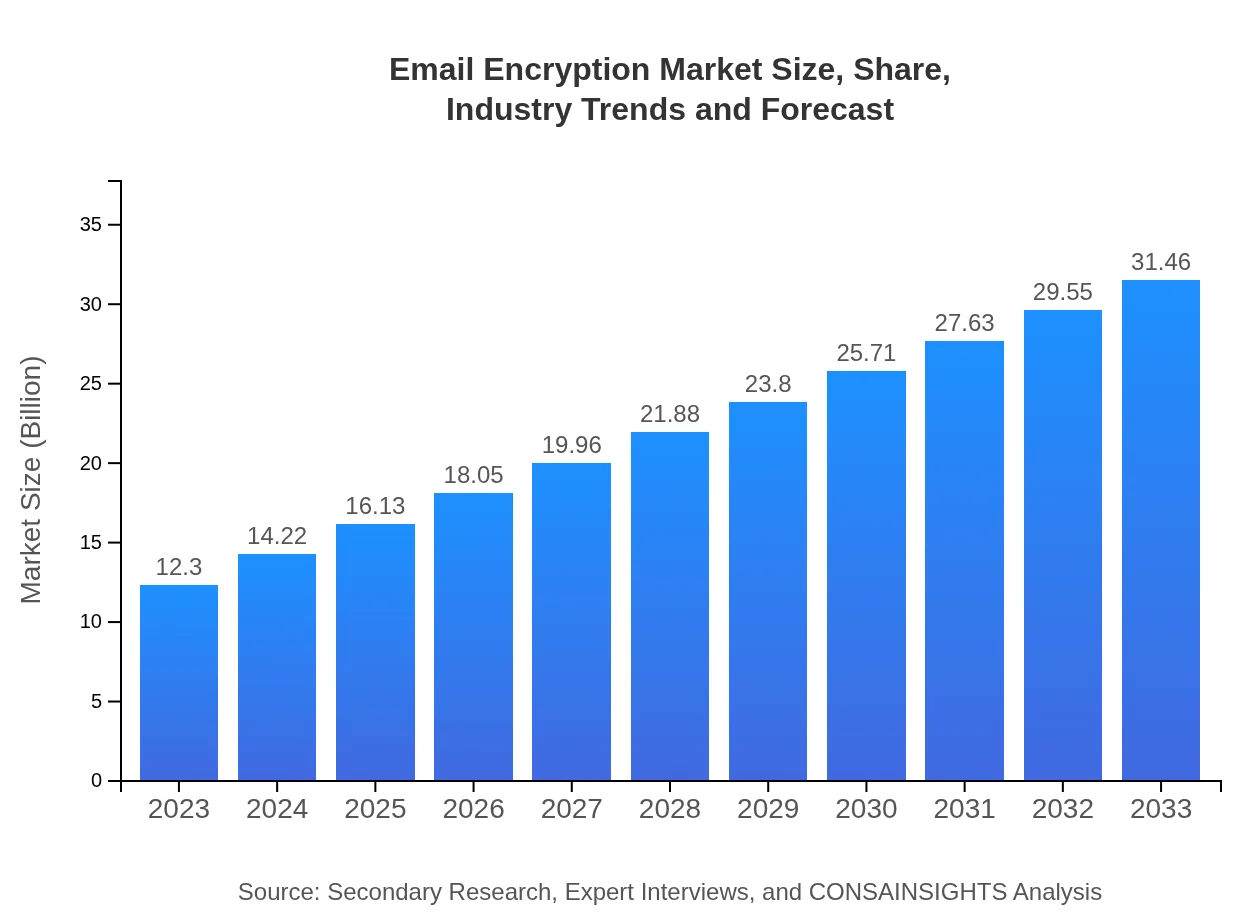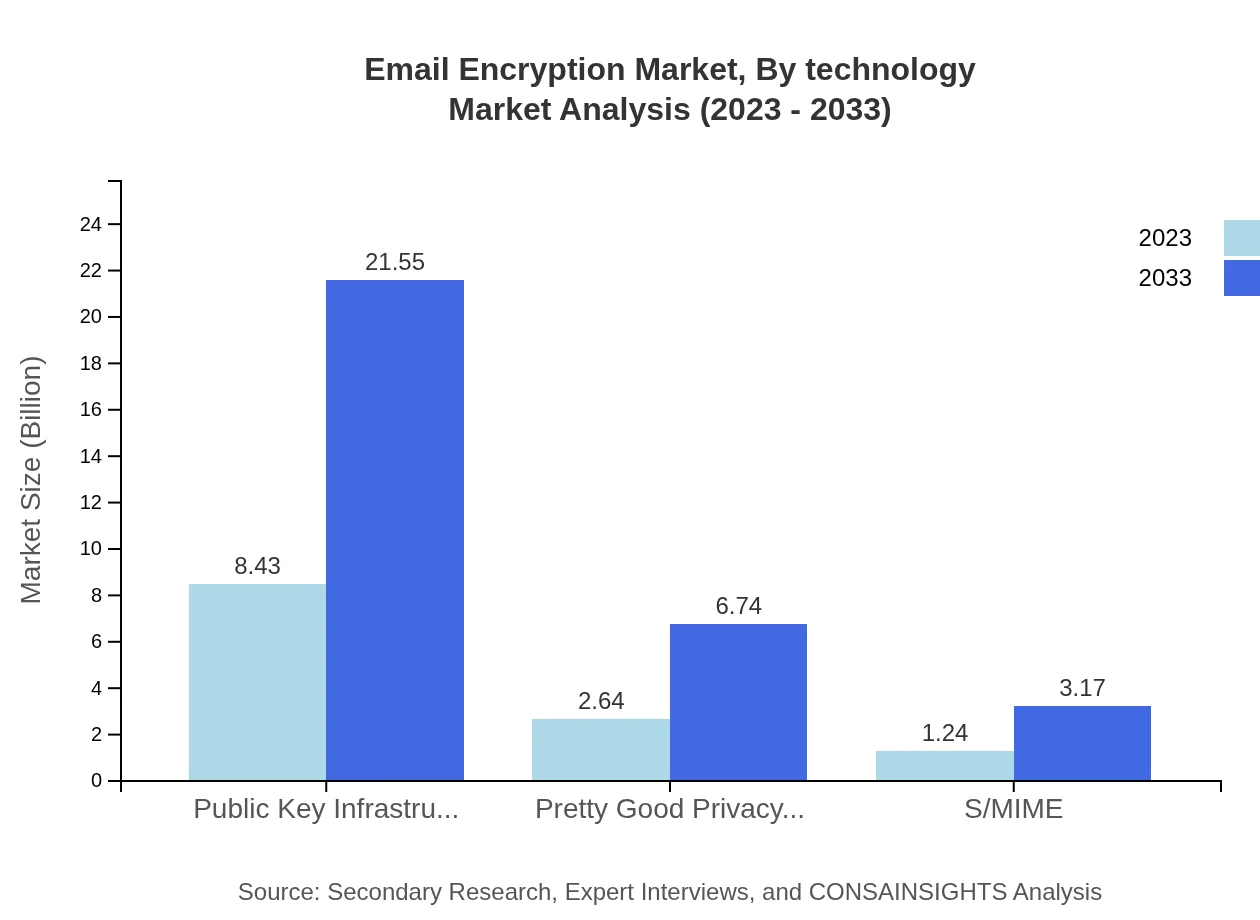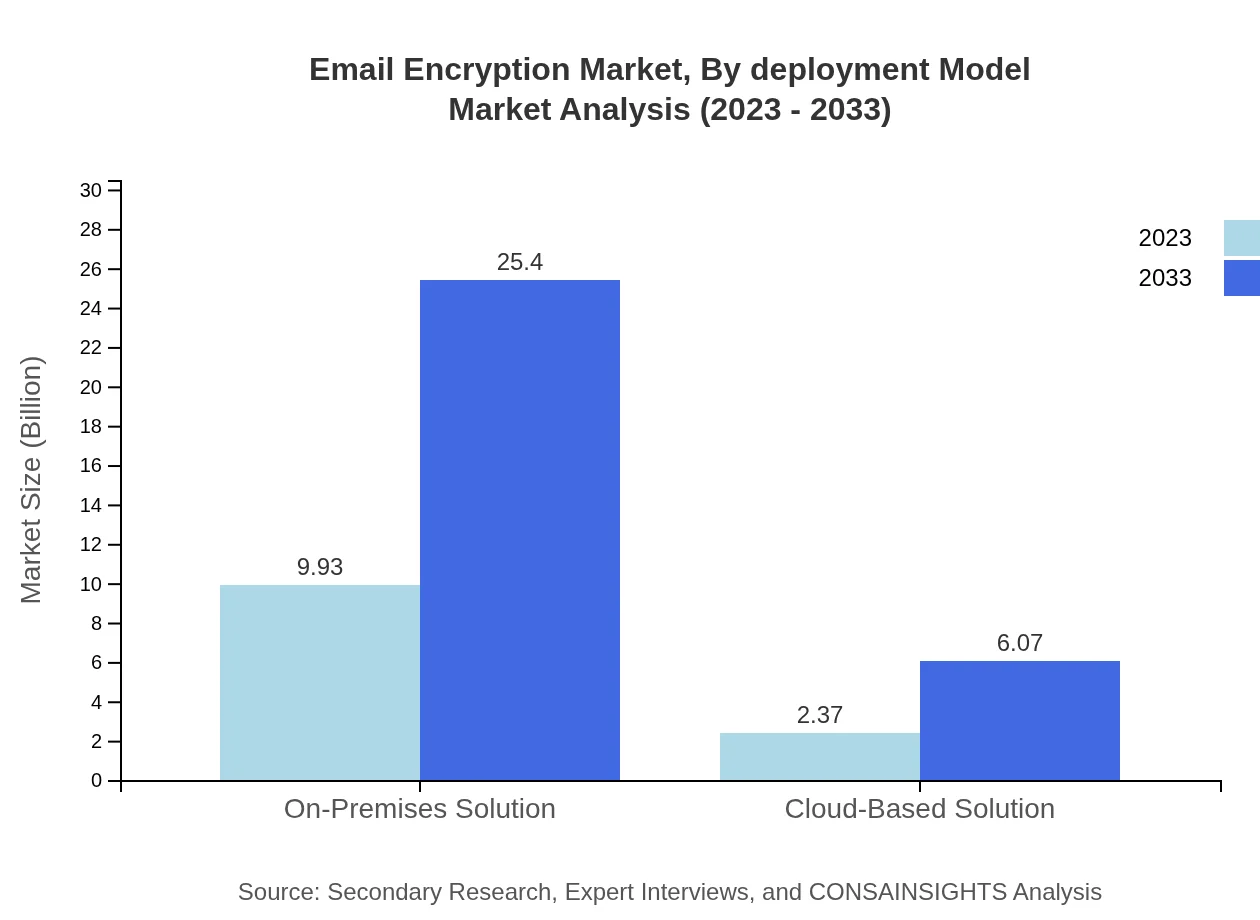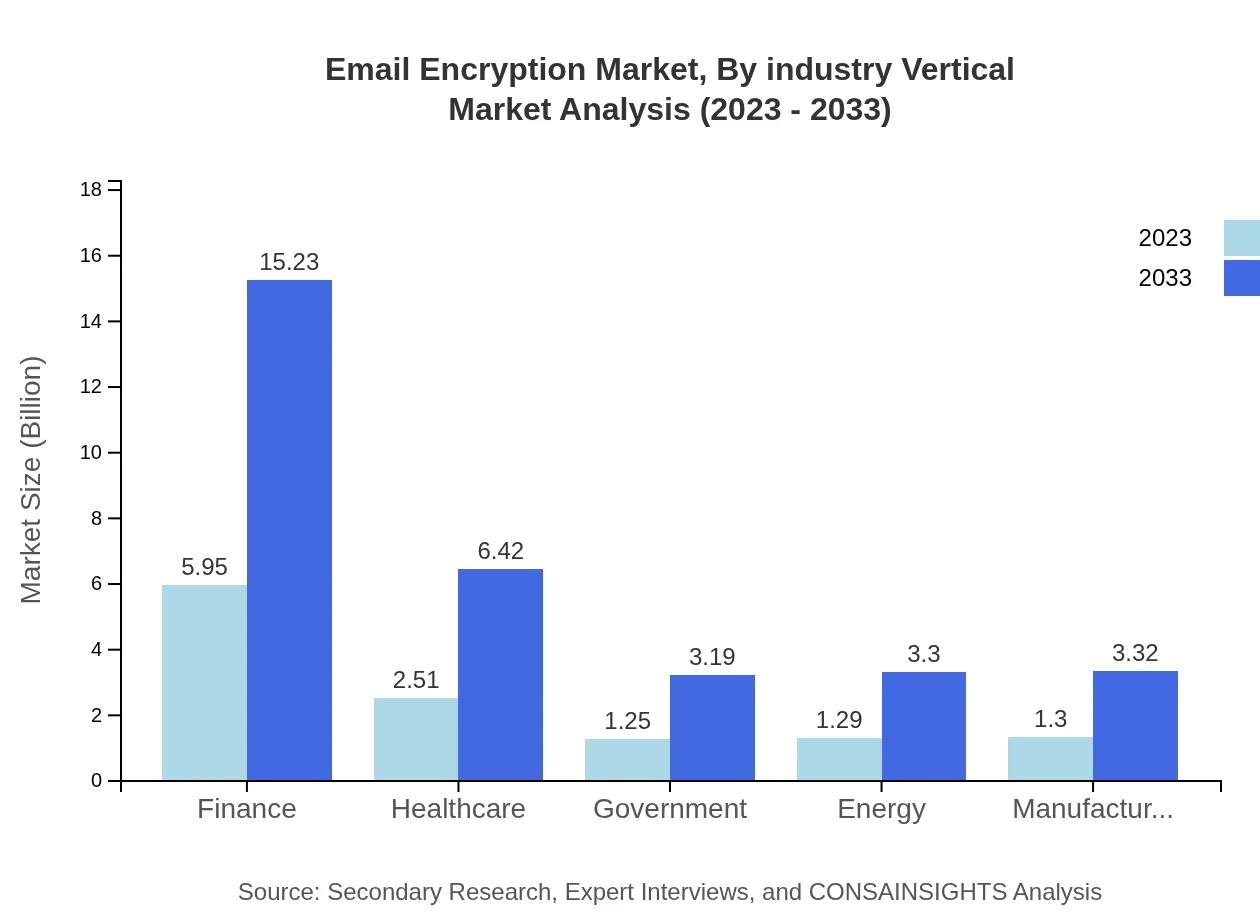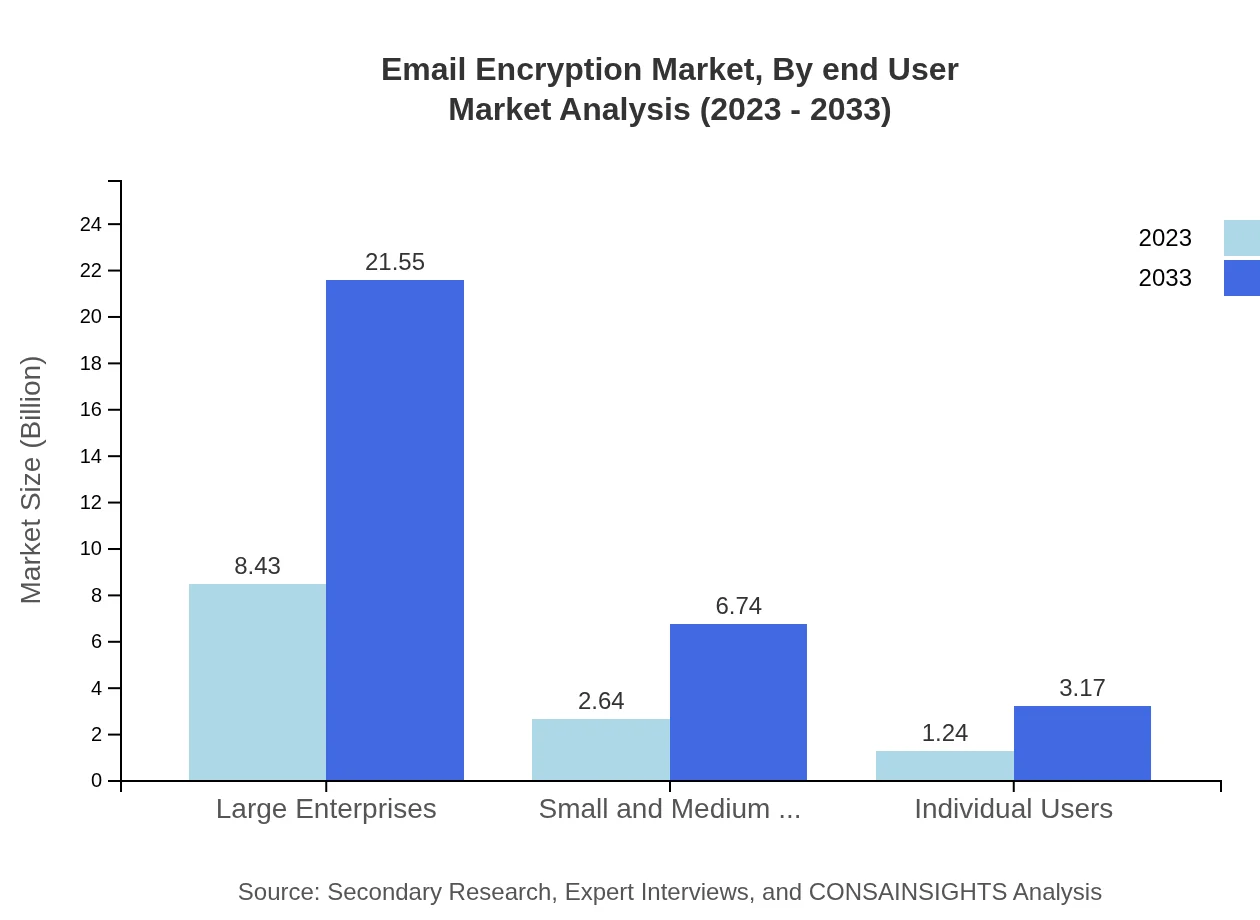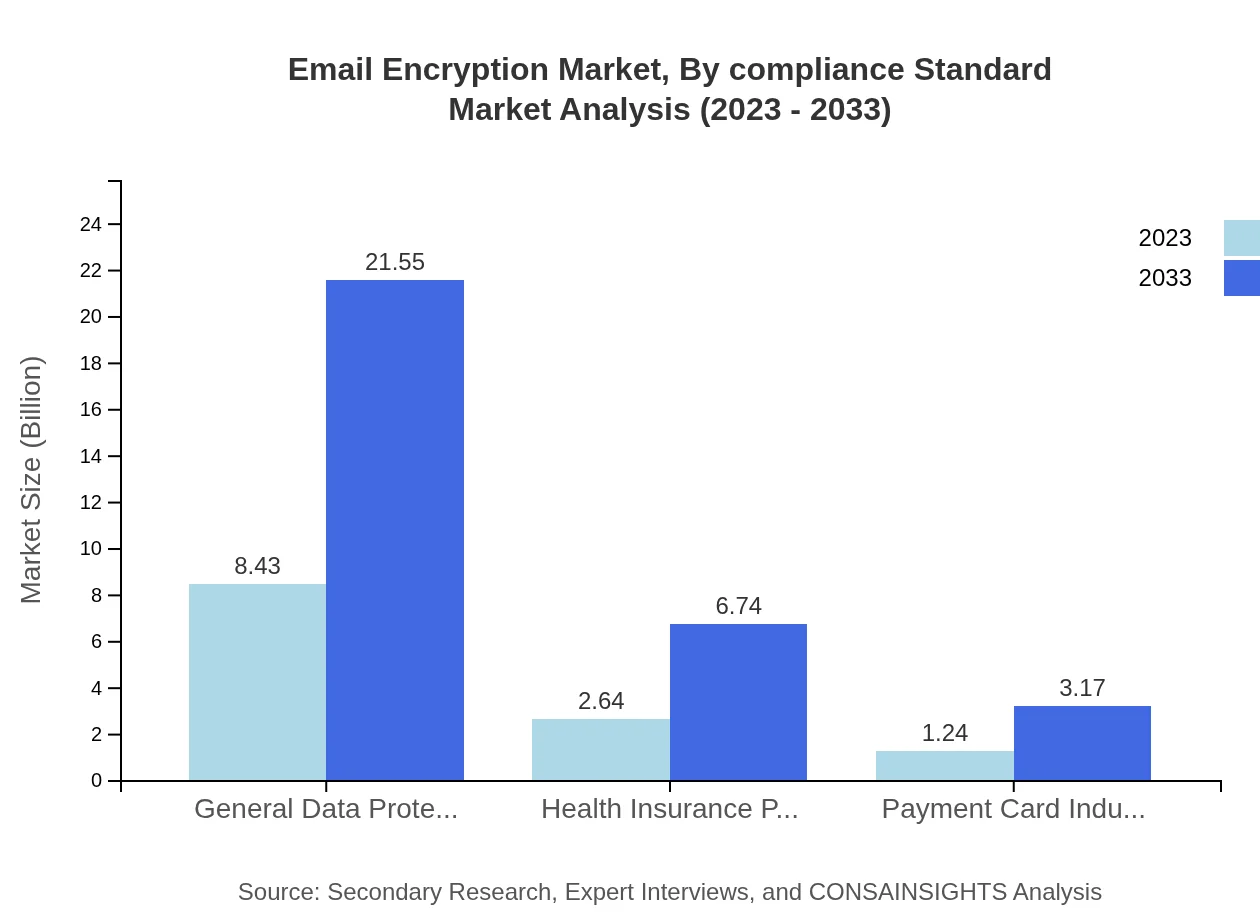Email Encryption Market Report
Published Date: 31 January 2026 | Report Code: email-encryption
Email Encryption Market Size, Share, Industry Trends and Forecast to 2033
This report provides a comprehensive analysis of the Email Encryption market, including market trends, segmentation, and forecasts from 2023 to 2033, focusing on key players and technology advancements.
| Metric | Value |
|---|---|
| Study Period | 2023 - 2033 |
| 2023 Market Size | $12.30 Billion |
| CAGR (2023-2033) | 9.5% |
| 2033 Market Size | $31.46 Billion |
| Top Companies | McAfee, LLC., Symantec Corporation, Zix Corporation, Cisco Systems, Inc., Proofpoint, Inc. |
| Last Modified Date | 31 January 2026 |
Email Encryption Market Overview
Customize Email Encryption Market Report market research report
- ✔ Get in-depth analysis of Email Encryption market size, growth, and forecasts.
- ✔ Understand Email Encryption's regional dynamics and industry-specific trends.
- ✔ Identify potential applications, end-user demand, and growth segments in Email Encryption
What is the Market Size & CAGR of Email Encryption market in 2023?
Email Encryption Industry Analysis
Email Encryption Market Segmentation and Scope
Tell us your focus area and get a customized research report.
Email Encryption Market Analysis Report by Region
Europe Email Encryption Market Report:
Europe's market for Email Encryption is anticipated to grow from USD 4.24 billion in 2023 to USD 10.84 billion in 2033. Stricter data privacy regulations emphasize the need for secure email communications among organizations.Asia Pacific Email Encryption Market Report:
In 2023, the Asia Pacific region values the Email Encryption market at USD 2.09 billion, with projections reaching USD 5.35 billion by 2033. Growing internet penetration and awareness of cybersecurity threats are spurring investments in email security solutions.North America Email Encryption Market Report:
North America is a leading region with an estimated market size of USD 4.19 billion in 2023, growing to USD 10.72 billion by 2033. The presence of major technology firms and stringent IT security regulations contribute to its dominance.South America Email Encryption Market Report:
The South American Email Encryption market is valued at USD 0.28 billion in 2023, expected to increase to USD 0.72 billion by 2033. As businesses in the region continue to digitalize, the importance of securing communications will drive market growth.Middle East & Africa Email Encryption Market Report:
The Middle East and Africa Email Encryption market is valued at USD 1.50 billion in 2023, with forecasts suggesting it will reach USD 3.84 billion by 2033. Increased digital transformation and regulatory compliance are driving investments in email security.Tell us your focus area and get a customized research report.
Email Encryption Market Analysis By Technology
The Email Encryption market is dominated by technologies such as Public Key Infrastructure (PKI), Pretty Good Privacy (PGP), and S/MIME, each catering to different organizational needs. PKI holds significant market share due to its robust security features, while PGP is popular among smaller organizations for its ease of use. S/MIME is primarily adopted in industries requiring high security.
Email Encryption Market Analysis By Deployment Model
The deployment model segment highlights a preference for On-Premises Solutions, which accounted for 80.72% of the market in 2023, as businesses prioritize control over sensitive communications. However, Cloud-Based Solutions are gaining traction for their convenience and scalability, making up 19.28% of the market currently.
Email Encryption Market Analysis By Industry Vertical
The Finance sector leads the Email Encryption market, utilizing 48.4% of the total market share in 2023, driven by regulatory pressures. Healthcare follows with significant demand owing to patient confidentiality regulations, with a 20.4% market share. Government sectors also invest in email encryption to protect sensitive governmental communications.
Email Encryption Market Analysis By End User
The market is primarily driven by Large Enterprises, which comprise 68.51% share in 2023, driven by their stringent data protection requirements. Meanwhile, Small and Medium Enterprises (SMEs) account for 21.43%, showcasing a notable increase as they recognize the importance of email security.
Email Encryption Market Analysis By Compliance Standard
Compliance standards such as GDPR and HIPAA significantly influence the Email Encryption market. GDPR compliance, representing 68.51% of the share in 2023, necessitates robust data protection measures among organizations in Europe, while HIPAA drives similar demand in the healthcare sector.
Email Encryption Market Trends and Future Forecast
Tell us your focus area and get a customized research report.
Global Market Leaders and Top Companies in Email Encryption Industry
McAfee, LLC.:
A leading cybersecurity company providing a comprehensive suite of email encryption solutions aimed at protecting businesses from data breaches.Symantec Corporation:
Known for its advanced security and encryption services, Symantec offers robust email encryption solutions widely adopted across various industries.Zix Corporation:
Specializing in email encryption services, Zix offers tailored solutions predominantly for healthcare and financial sectors to comply with regulations.Cisco Systems, Inc.:
Cisco provides integrated security solutions, including email encryption, leveraging its expertise in networking and communication technologies.Proofpoint, Inc.:
Offers advanced email security and data protection services, combining comprehensive threat detection with strong encryption solutions.We're grateful to work with incredible clients.









FAQs
What is the market size of email encryption?
The global email encryption market is valued at approximately $12.3 billion in 2023, with an expected CAGR of 9.5% from 2023 to 2033. This growth highlights the escalating demand for secure communication across various industries.
What are the key market players or companies in the email encryption industry?
Key players in the email encryption market include established tech giants and new entrants, dedicated to providing robust solutions. These players focus on innovation and compliance with regulations to ensure data security in email communications.
What are the primary factors driving the growth in the email encryption industry?
The growth in the email encryption industry is driven by increasing cyber threats, stringent government regulations like GDPR, and the rising need for data protection across sectors. These factors compel organizations to adopt encryption solutions.
Which region is the fastest Growing in the email encryption?
The fastest-growing region for the email encryption market is Europe, projected to grow from $4.24 billion in 2023 to $10.84 billion by 2033. This growth is fueled by strong regulatory frameworks and high cybersecurity awareness.
Does ConsaInsights provide customized market report data for the email encryption industry?
Yes, ConsaInsights offers tailored market reports that cater to specific industry needs within the email encryption sector. Clients can request customized insights based on their operational requirements and market interests.
What deliverables can I expect from this email encryption market research project?
In the email encryption market research project, clients can expect comprehensive reports that include market size analysis, trends, competitive landscape, forecasts, and segment insights, aiding strategic decision-making.
What are the market trends of email encryption?
Current trends in the email encryption market include a shift towards cloud-based solutions, the rise of AI-driven security measures, and increasing focus on regulatory compliance across industries, shaping the future of email security.

